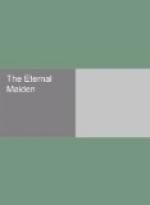“Spirit of my mother, thou who wast carried by the storm-winds into the sea! Hear me! Annadoah loved one Olafaksoah, a chief from the south; for him the heart of Annadoah became very great within her. And now the heart of Annadoah aches. For he hath gone to the south. And not until the birds sing in spring will he return. And Annadoah is left alone. Ookiah comes with the lash of wicked walrus thongs, and there is no blubber buried outside Annadoah’s shelter. Neither is there oil. And the couch of Annadoah is cold—so very cold. Yea, listen, spirit of my mother, and bring Olafaksoah back, that he may bruise Annadoah’s hands, that he may cast Annadoah to the ground and crush Annadoah if he wills with his feet! Io-oh-h!”
She moaned this in a curious sing-song sort of chant. Over the ice the voices of the other women rose, and each, to her departed relatives and friends who had died in the sea, told about the important incidents of the year and the misgivings for the winter, in a varying crooning song.
Annadoah passed Tongiguaq, who jumped and danced in a frenzy of grief. Tongiguaq had lost three children; two had been drowned, and a new-born baby, three months before, was born maimed. According to the custom of the people, a fatherless defective child is doomed to death. So rigorous is their struggle to survive, so limited the means of existence, that a tribe cannot bear the burden of a single unnecessary life. So in keeping with this Lycurgean law, worked out by instinct after the stern experience of ages, a rope had been twisted about the neck of Tongiguaq’s baby and it had been cast into the sea.
All this the weeping woman told in her chant to the departed. When she saw Annadoah approaching, she paused.
“Here cometh the she-wolf that hath devoured the food of our tribe,” she wailed, intense bitterness in her voice. “Yea, by her cajolery she persuaded our men to give unto the traders from the south our precious food. And now we starve! Yea, she hath robbed us. She is as the breath of winter, as the blackness of the night.”
Along the line of wailing women Tongiguaq’s reproach was suddenly taken up. As Annadoah walked by them they did a strange thing. The natives fear their dead—they never even mention their names. For possessed of great power are the dead, and they can wreak, as befits their moods, unlimited good or ill. Believing they could persuade the dead to array themselves against Annadoah, the women took up Tongiguaq’s denunciation and reviled Annadoah in their weird chant to the departed. Annadoah wrung her hands and wept. Bitter and jealous because the white chief had selected her during his stay, their bosoms full of the harbored ill will and envy of years because she had been the most desired by the young men of the tribes, the women now invoked curses upon the deserted and unprotected girl through the medium of the incorporeal powers.




